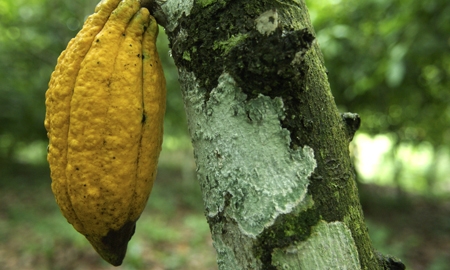Ghana’s cocoa production for 2010/2011 passed the milestone of one million tons – an increase of more than 50 per cent on the previous season’s harvest.
Favourable weather conditions helped but improved farming techniques also played their part, for which the government, Ghana Cocoa Board (Cocobod) and the farmers themselves can also take credit.
The world’s number two cocoa grower after Côte d’Ivoire, Ghana is number one when it comes to the quality of its cocoa beans, setting the standard against which cocoa from everywhere else is measured. As the best cocoa for making high quality chocolate, Ghanaian cocoa is first choice for leading chocolate and beverage producers and trades at a high premium on the international commodities markets.
Quality control is the job of Cocobod, which is the regulator and sole buyer of the nation’s crop. “Ghana is known for its cocoa. It is the best in the world,” says Tony Fofie, Cocobod’s Chief Executive Officer.
Maintaining the quality and improving the yield are crucial, as cocoa is a mainstay of the economy. Ghana’s second biggest foreign exchange earner after gold, it provides employment for up to three million Ghanaians – around a quarter of the workforce.
With less help from the weather, production in the 2011/2012 season is unlikely to break any records. British Monitor International (BMI) expects production yields for 2011/2012 to moderate to 912,600 tons. However, it forecasts growth of 9.7 per cent to 2015/16 that will raise annual production to 1.1 million tons.
According to the BMI’s Q2 Ghana Agribusiness Report, Ghana’s rising GDP should allow easier credit access to cocoa farmers wanting to expand production. “This growth, combined with the ageing stock in Côte d’Ivoire, has some optimistic observers predicting that Ghana could overtake Côte d’Ivoire as the world’s largest cocoa producer and exporter within a few years,” it adds.
“For the country to be able to feed her people and liberate ourselves from abject poverty, smallholder farmers need to put an end to subsistence farming and embrace modern farming with improved seeds, irrigation facilities and also have access to ready markets, storage and enough technology to prevent post harvest loses.” Kwesi ahwoi, Minister of Food and agriculture |
Meanwhile, Cocobod has recently embarked on a massive programme to rehabilitate the cocoa farms and spread the use of improved farming techniques. Cocoa seed nurseries are to be established and 20 million seedlings will be distributed free of charge to cocoa farmers for planting over a five-year period.
In addition to boosting production, Cocobod is keen to encourage young people to learn cocoa production skills and techniques and stay in the rural areas, rather than being tempted into the cities or the oil and mining sectors.
More than 90 per cent of Ghana’s cocoa is grown on small farms in six areas of the country – Ashanti, Brong Ahafo, Eastern, Volta, and the Central and Western regions – where the rainfall averages between 39 and 59 inches per year.
Last year’s record crop was good for the cocoa farmers as well as the economy. Through Cocobod, the government paid the farmers about 80 per cent of the world market price – more than has been paid by any previous administration. And in March, it announced it has no plans to cut the local price in the coming 2012/13 season, despite the fall in the world market price of cocoa during the past year.
A high percentage of Ghana’s cocoa beans go to the EU. “Germany processes a lot of Ghanaian cocoa, says Mr Fofie. “There are the traditional European markets, such as Germany, the Netherlands, and Belgium, as well as the emerging markets. We are also interested in China and India. India consumes a lot of Cadbury chocolate, which contains Ghanaian cocoa.”
In Japan, he says, 70 per cent of the cocoa factories’ capacity is dedicated to processing Ghanaian cocoa.
Cocobod is keen to encourage foreign investors to bring skills and technology to the industry, and there have already been collaborations with companies like Cadbury-Kraft and Nestlé.
In September 2011, the board secured a record syndicated loan deal of around $2 billion for purchasing cocoa and expanding the industry. More than 50 banks contributed towards making the deal possible.
“Here at Cocobod, we are able to source funding from several parts of the world,” says Mr Fofie. “Last year, for example, we were able to raise almost $2 billion against all odds. The confidence of more than 50 European and American banks demonstrates the kind of sound framework we have.”

0 COMMENTS